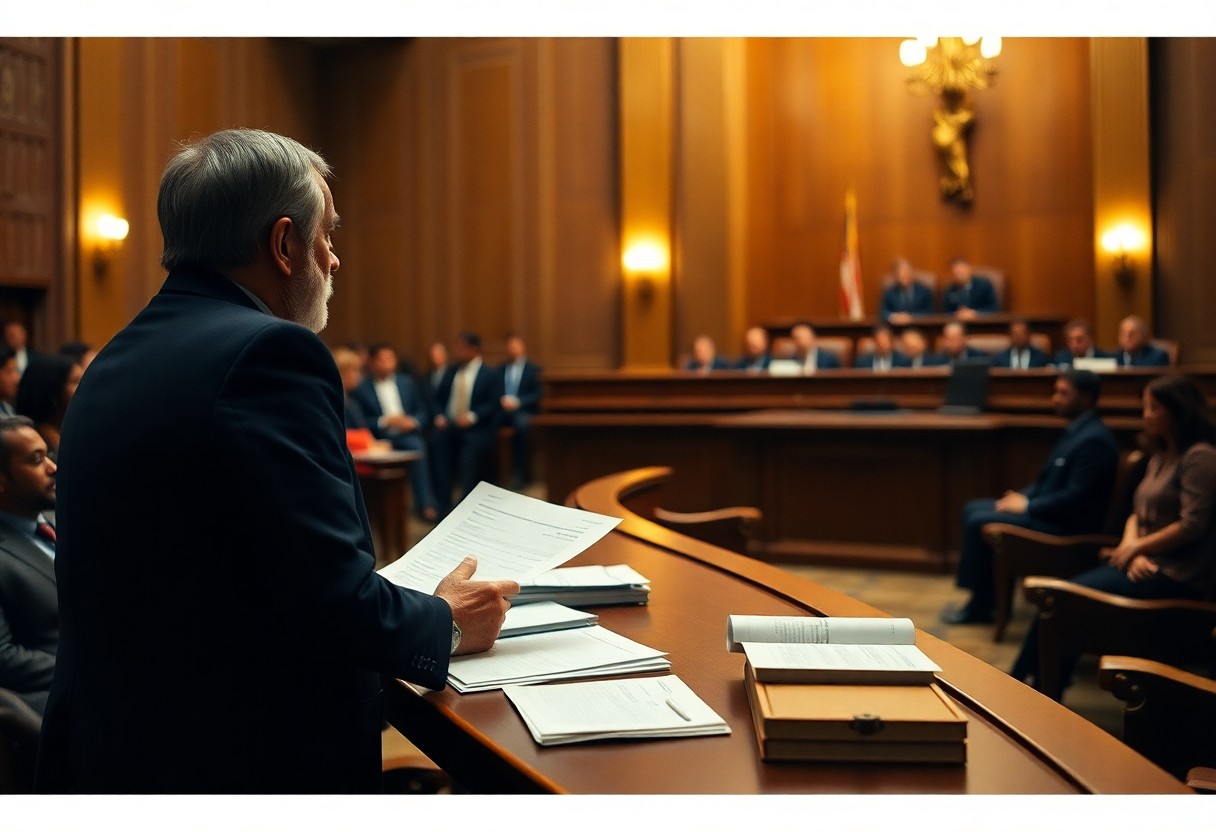Cases involving psychologist witnesses often arise in various legal contexts, such as custody disputes, personal injury claims, or criminal proceedings. You may find that psychologists provide expert testimony on issues like mental competency, emotional distress, or the psychological impact of trauma. Understanding the roles these professionals play and the types of cases they typically address can enhance your comprehension of the legal proceedings you encounter. In this post, we will explore the common scenarios where psychologist witnesses are called to provide their insights and assessments.

The Role of Psychologist Witnesses in Legal Proceedings
Definition and Importance
The role of psychologist witnesses in legal proceedings is to provide expert testimony regarding psychological factors that are relevant to a case. Their insights can significantly impact the court’s understanding of mental health issues, the competency of individuals, and the implications of psychological evaluations. This makes their expertise vital for informed legal decisions.
Scope of Practice
Along the lines of your understanding of psychology, psychologist witnesses encompass a wide range of practices. They may assess individuals’ mental states, offer opinions on competency, and discuss the psychological dimensions of criminal behavior, among other functions.
In addition to assessing competency and providing evaluations, psychologist witnesses also help in understanding the implications of mental health on a person’s behaviors or actions during legal disputes. They can shed light on how various psychological disorders may affect decision-making abilities or the understanding of the legal process. This involvement not only aids the court but also provides crucial insights that can lead to fairer outcomes for those involved in legal matters.
Types of Cases Involving Psychologist Witnesses
One of the primary roles of a psychologist witness is to provide expert testimony in various legal cases. These cases often draw on psychological principles to clarify the proceedings. Below are some common types of cases where psychologists may serve as witnesses:
- Criminal Cases
- Civil Cases
- Family Court Proceedings
- Competency Evaluations
- Risk Assessments
Knowing the different types can help you understand the relevance of psychologist witnesses in the legal system.
| Type of Case | Role of Psychologist Witness |
|---|---|
| Criminal Cases | Evaluate mental state and competency of the defendant. |
| Civil Cases | Assess emotional distress, competence, and damages. |
| Family Court Proceedings | Provide insights on parenting, custody, and child welfare. |
| Competency Evaluations | Determine mental capacity to stand trial. |
| Risk Assessments | Evaluate potential risks to others and self. |
Criminal Cases
Among the cases where psychologist witnesses are often called upon are criminal cases. In this context, psychologists may evaluate a defendant’s mental state at the time of the crime, as well as their competency to stand trial. Your insights from psychological evaluations can prove pivotal in the court’s understanding of the defendant’s actions and mental capacity.
Civil Cases
Types of civil cases that may involve psychologist witnesses include personal injury claims, employment disputes, and malpractice suits. In such instances, psychologists may assess emotional distress and the psychological impact of events on the involved parties. Your expert analysis can help establish connections between psychological injuries and the claims made in court.
Competency evaluations in civil cases often focus on a person’s ability to make informed decisions regarding their legal matters. You, as a psychologist, may provide testimony regarding the individual’s understanding of the situation, their ability to communicate their needs, and their capacity to appreciate the consequences of their choices.
Family Court Proceedings
Family law cases often necessitate the expertise of psychologist witnesses to address matters related to custody and parental rights. Here, psychologists assess family dynamics and the best interests of children involved in custody disputes. Your evaluations can be instrumental in providing recommendations to the court.
Consequently, family court proceedings can greatly benefit from your insights, especially regarding the psychological well-being of children. You may conduct evaluations that enable the court to make informed decisions about custody arrangements and ongoing family support systems, ensuring the best possible outcome for all parties involved.
Qualifications and Credentials of Psychologist Witnesses
Not all psychologists are suitable to serve as witnesses in legal cases. The qualifications and credentials of psychologist witnesses can greatly impact the court’s perception of their testimony and the overall case outcome. Understanding the educational background, licensure, and relevant experience of these professionals is imperative when evaluating their suitability for the task.
Educational Requirements
Beside having a doctoral degree in psychology, which typically includes a Ph.D. or Psy.D., you should also consider the specific training a psychologist has received. Specialized coursework and clinical training relevant to your case can enhance their expertise and credibility in a legal setting.
Licensure and Certifications
Witnesses in psychological cases must hold appropriate licensure to practice in their field. This often includes state licensing as a psychologist, which demonstrates that they have met specific educational and professional standards. Additionally, you may find that some psychologists pursue further certifications in specialized areas of psychology, which can add to their qualifications.
Licensure not only validates the psychologist’s education but also mandates adherence to ethical standards and continuous education. This ensures you are dealing with a professional who is both knowledgeable and committed to maintaining their credentials through ongoing training and adherence to the latest developments in the field.
Experience and Specializations
Along with education and licensure, your consideration should extend to the psychologist’s relevant experience and specific areas of specialization. The more aligned their background is with the particulars of your case, the more valuable their contributions will be during testimony.
Qualifications play a significant role in establishing a psychologist’s credibility. The relevant experience enhances their ability to interpret complex emotional and behavioral patterns, and specialized skills enable them to provide expert opinions that are directly relevant to the legal issues at hand. By assessing all these factors, you can ensure a robust evaluation of potential psychologist witnesses.
Preparation for Testimony
Many factors contribute to a successful testimony from a psychologist. Preparation is vital, not only to ensure that you present your findings clearly and accurately, but also to establish your credibility as an expert witness. This chapter discusses the imperative steps you should undertake to prepare effectively for your role in court.
Gathering Relevant Evidence
Above all, you need to collect and review all pertinent evidence related to the case. This may include clinical records, assessments, and any relevant literature that supports your findings. By assembling comprehensive documentation, you can form a solid foundation for your testimony and bolster your arguments during cross-examination.
Crafting Expert Opinions
Testimony will involve expressing your expert opinions in a manner that is both clear and persuasive. Your role is to translate complex psychological concepts into language that is understandable to a lay audience, including judges and juries. To achieve this, using straightforward terminology and concrete examples is important to illustrate your points effectively.
Evidence from psychological assessments and therapeutic interactions can guide your expert opinion. By linking your findings firmly to the data, you strengthen the legitimacy of your statements. It is also helpful to consider potential counterarguments, so you can prepare to address any challenges to your opinions confidently during your testimony.
Understanding Legal Procedures
Among the many aspects of preparation, understanding the legal procedures associated with your testimony is vital. Familiarizing yourself with the court rules and expectations for expert witnesses helps you navigate the process smoothly and maintain professionalism throughout the proceedings.
At various stages of the preparation, you should consult legal professionals to clarify any uncertainties regarding courtroom etiquette and procedural obligations. By doing so, you enhance your effectiveness and demonstrate competence, which ultimately contributes to the weight of your testimony in the court’s eyes.
Challenges Faced by Psychologist Witnesses
Your role as a psychologist witness can be demanding, as you navigate various challenges inherent in the legal system. Understanding these challenges is key to effectively representing your expertise and serving the justice process.
Cross-Examination Techniques
Challenges arise during cross-examination, where attorneys may employ aggressive techniques to undermine your testimony. You may find yourself facing pointed questions designed to elicit doubt about your qualifications, methods, or objectivity.
Bias and Objectivity Issues
Against the backdrop of legal proceedings, your impartiality may be questioned, leading to potential concerns about bias. You must maintain an unwavering commitment to objectivity, but this can be particularly challenging in emotionally charged cases.
At times, details of the case may resonate with your personal beliefs or experiences, creating subconscious biases. This sensation can cloud your judgment and impact the clarity of your assessments. As a psychologist witness, it’s necessary to self-reflect on any biases that could affect your testimony, ensuring that your evaluations remain grounded in evidence and facts.
Ethical Considerations
With the complexities of legal proceedings, ethical dilemmas often arise that can complicate your role as a witness. Navigating the boundaries of confidentiality, informed consent, and the duty to the court can challenge your decision-making process.
In addition to maintaining these ethical standards, you must communicate your findings transparently and accurately. Ethical considerations require that you remain vigilant in balancing the needs of the legal system with the rights of individuals involved, ensuring that your testimony contributes to a fair and just outcome.
Judicial Reception of Psychologist Testimony
After considering various factors, the judicial reception of psychologist testimony can significantly affect legal proceedings. Understanding how courts evaluate this type of evidence can enhance your ability to interpret and utilize psychologist witnesses effectively in your case.
Admissibility Standards
Admissibility standards dictate when psychologist testimony can be allowed in court. Generally, courts assess the relevance and reliability of the psychologist’s expertise, ensuring that the information provided assists the jury in understanding complex issues pertinent to the case.
Case Law Examples
Between various landmark cases, courts have navigated the intricacies of psychologist testimony with varying outcomes. Familiarizing yourself with these cases can give you insight into the judicial trends surrounding psychological evidence.
Examples of significant cases illustrate how the courts have approached the submission of psychologist testimony. In *Daubert v. Merrell Dow Pharmaceuticals, Inc.*, for instance, the Supreme Court established crucial criteria concerning the scientific validity and relevance of expert witness testimony, including that of psychologists. This case set a precedent for evaluating expert opinion, ultimately affecting numerous subsequent rulings in similar contexts.
Impact on Jury Decisions
Any testimony provided by psychologists can shape jury decisions and perceptions considerable. When jurors receive expert insight into psychological assessments, their understanding of a defendant’s mental state or the impact of trauma can profoundly influence their judgment.
At times, the inclusion of psychologist testimony helps jurors better grasp the complexities of human behavior, especially in cases involving mental illness or emotional distress. By leveraging psychological perspectives, jurors may take into account factors they would not have considered otherwise, potentially altering their evaluation of evidence and, consequently, the outcome of the trial.
Conclusion
So, when considering common cases involving psychologist witnesses, you should recognize the significant role they play in legal proceedings. Whether it’s assessments of competency, providing insights into behavior, or evaluating emotional states, their expertise can help clarify complex psychological matters for the court. By understanding these cases, you can appreciate how psychological evaluations can influence judicial outcomes and impact both parties involved in litigation.
FAQ
Q: What role does a psychologist witness play in legal proceedings?
A: A psychologist witness provides expert testimony based on their specialized knowledge in psychology. They may assess an individual’s mental health, analyze behavioral patterns, and offer insights into psychological factors that could influence a case. Their input can be vital in cases such as child custody disputes, personal injury claims, and criminal cases, where mental state is significant.
Q: In what types of cases are psychologist witnesses commonly involved?
A: Psychologist witnesses are often involved in various types of cases, including family law (such as custody evaluations), personal injury claims (where psychological impact is assessed), criminal cases (evaluating competency to stand trial or criminal responsibility), and workplace disputes (addressing issues like discrimination or harassment). Each scenario requires careful consideration of psychological factors that may affect the case outcome.
Q: How do psychologists prepare for their role as expert witnesses?
A: Psychologists prepare by reviewing case materials, conducting relevant assessments, and formulating their opinions based on established psychological principles and research. They stay updated on legal standards related to their field and may also practice delivering their findings in a clear and comprehensible manner suitable for a courtroom setting. Preparation may also involve mock testimony to anticipate potential cross-examination questions.
Q: What qualifications should a psychologist witness have?
A: A psychologist witness should hold advanced degrees in psychology, such as a Ph.D. or Psy.D., and often possess specialized training in areas relevant to the case, such as forensic psychology or clinical psychology. Additionally, experience working in the legal system and familiarity with courtroom procedures are important qualifications, as is a strong grasp of ethical standards in their field.
Q: Can psychologist witness testimony be challenged in court?
A: Yes, psychologist witness testimony can be challenged by opposing counsel. This may involve scrutinizing the psychologist’s qualifications, the methodologies used in assessments, and the validity of their conclusions. Courts may also assess whether the testimony meets specific legal standards, such as those established in the Daubert or Frye tests, which evaluate scientific testimony based on relevance and reliability.





